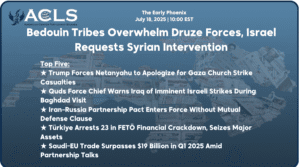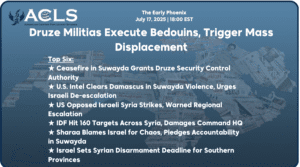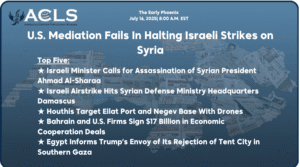Peace In The Region During Ramadan Is Unlikely
By Rania Kisar
Executive Summary:
During the weekend, we witnessed a very significant event that reminds us of the Iran-Iraq Tanker War between 1985-1988. Iran seized an Iraqi oil tanker that was headed to Turkey. The clerical government announced that this attack was carried out following a United Nations Security Council statement calling for an end to the Houthi militia’s maritime attacks. The Iranian elections were another indicator of the impossibility for Iran to reach a peaceful stance that would bring peace and security to it and the neighboring countries. The obviously rigged election results showed that those who will take control of the Council of Guardians and the Legislative Council are none but those who advocate for violence against those who do not adhere to the implementation of Islamic teachings, even on a personal level. The Iranian elections also indicated a potential complete collapse of the Iranian theocratic regime following the death of the leader of what is called the Iranian revolution, Khamenei, as signs of deep disputes that will begin during the process of choosing his successor are already emerging. This might be the only hope available to the Iranian people, but it should not remain so, and the peoples in Iran can continue their revolution until the regime is overthrown.
Israel’s plea for a detailed list of hostages for a potential cease-fire to lessen Palestinian suffering went unheeded. Sinwar has been incommunicado for over a week, and Israeli hopes were dashed by Qatar’s indication of Hamas’s refusal. Vice President Kamala Harris’s sympathetic remarks inadvertently complicated matters due to their widespread dissemination in Arabic media, thereby isolating Israel from its traditional American support and impeding its campaign against Hamas.
In Lebanon, escalating tensions suggest an impending war, with both factions intensifying their assaults. Amos Hochestin’s diplomatic efforts in Beirut fell flat as Hezbollah declined any commitment to peace, with ongoing fierce exchanges between Hezbollah and Israel exacerbating regional instability.
A looming environmental catastrophe threatens Yemeni and Djibouti ports due to the Raymar, a sinking ship laden with fertilizers and oil, poised to surpass the Safar disaster’s impact. Urgent U.S. intervention is crucial to prevent a massive ecological and humanitarian crisis.
Armenia’s overture to Turkiye signals a willingness to reconcile, potentially reshaping regional dynamics and pressuring foes like Iran. This development, if realized, could herald a new era in Armenian-Turkish relations, deserving of continuous encouragement and commendation from the international community.
During this period, Bashar al-Assad has become widely mocked, particularly following his recent forecasts regarding the American presidency and his proposal to target individuals shaping U.S. foreign policy. This has further cemented his reputation as an out-of-touch aspirant philosopher. Despite his efforts to predict the future of American politics, he has not offered any strategies to address the internal security challenges in Syria, where civilians are exploited as shields by Iranian groups. He has also neglected to propose any remedies for the economic exploitation directed by his wife, Asma al-Assad, and their associates in regions they dominate. While Bashar is often derided as the neighborhood’s fool, the Syrian populace remains resolute in their belief that the fall of his deteriorating government will be a result of Syrian actions.
==================
★ IRAN
Iran’s Dual Challenges: Declining Voter Engagement and Bold Economic Strategies
New Tanker War Unfolds in Persian Gulf
Echoing the disruptive “Tanker War” of 1985-1988, Iran’s recent seizure of an oil tanker in the Sea of Oman signals a troubling resurgence of maritime tensions reminiscent of its past conflict with Iraq. This incident, targeting a vessel carrying Iraqi oil to Turkey, stirs historical echoes of Iran’s attempts to control regional power dynamics by hindering maritime navigation. Following a UN Security Council resolution urging an end to Houthi attacks in the Red Sea, this seizure underscores the continuity of Iran’s strategic maritime disruptions. The US State Department’s demand for the ship’s immediate release, coupled with global support for a US-led maritime protection task force, underlines the urgent need for a unified response to ensure navigational freedom. This act not only affects global trade, as seen in the Kiel Trade Index’s significant decline but also rekindles concerns over the persistent threat to international maritime security and the crucial role of international cooperation in mitigating such risks.
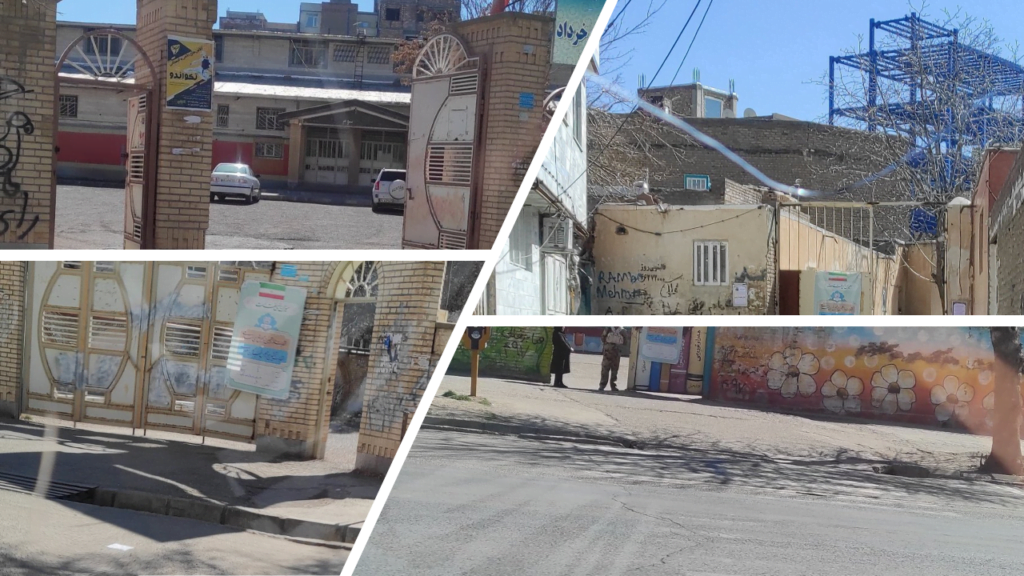
Iran’s Elections: Diminishing Engagement in Theocratic Rule
The recent parliamentary elections in Iran have underscored a profound transformation in the electorate’s mood, with voter turnout plummeting to an unprecedented low of under 40% since the revolution in 1979. In the capital, Tehran, out of 10 million qualified voters, merely 2.4 million cast their ballots, setting a new record for disengagement in the era of Islamic governance.
A notable portion of the populace expressed their dissent through the submission of void ballots, ingeniously adorned with the names and emblems of football stars, outnumbering the votes secured by the most popular candidates. Official figures revealed that over 380,000 ballots were invalidated, surpassing the leading candidate’s tally of 340,000 votes.
The hardline faction’s failure to consolidate a unified candidate roster for Tehran significantly impacted the election outcome. The conservative bloc emerged overwhelmingly victorious, clinching all 30 seats, whereas the United Front for the Islamic Revolution, under the stewardship of ex-Parliament Speaker Mohammad Baqer Ghalibaf, managed to secure a solitary seat. Ghalibaf, positioned fourth after the count of two-thirds of the ballots, found himself in a contest with a proponent of the Mohammad Taqi Mesbah Yazdi group, infamous for its sanctioning of violence through religious edicts against those opposing Sharia law.
In an uncontested race, President Ebrahim Raisi secured a third term in the Assembly of Experts with an 82% vote share in South Khorasan. Discussions are underway about elevating figures like Mohammad Javad Zarif in a strategic maneuver to bolster the regime’s resilience and perpetuity.
Regardless of the possible scenarios whether it is succession or a leadership council, the ultimate power play will belong to the Iranian Revolutionary Guard, so it can continue its expansionist foreign policies of trying a build a vital field that is reminiscent of the so-called Shiite Empire promised towards a super regional state by 2030, as proposed by the Expediency Discernment Council and approved by Khamenei.
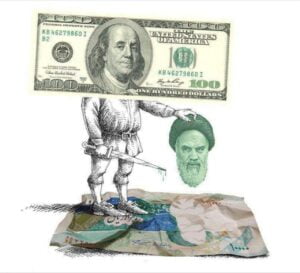
Iran’s Economic Maneuvers: Algeria, Syria, China
After Sudan rejected Iran’s naval base proposal on its Red Sea coast to avoid US and Israel tensions, President Raisi made a visit to Algeria, his first in 14 years, to enhance bilateral ties and regional cooperation, focusing on the Sahel and Western Sahara, and to promote economic, cultural, and technological partnerships. At the 7th GECF summit, Raisi showcased Iran as a crucial energy contributor, seeking investments in its natural gas sector to circumvent US sanctions and boost regional stability.
Despite recent US sanctions, Iran and Syria are launching a joint free zone, with Iran investing in Syrian infrastructure, energy, pharmaceuticals, and housing. Meanwhile, despite being China’s 38th trading partner with a $32 billion volume trailing behind regional peers in significant numbers, Iran prioritizes Chinese firms for Tehran infrastructure projects. This move, during economic downturns, faces criticism for overlooking local expertise in favor of securing Beijing’s support in the UN Security Council.
Concurrently, Iran’s internal wage negotiation delays, with the government proposing insufficient wage increases against 40% inflation, underscore a preference for international ambitions over domestic welfare. This prioritization comes as the economic crisis deepens, igniting protests and highlighting disparities, especially as Iran continues to allocate substantial funds to its regional proxies, further straining its economy and exacerbating the plight of Iranian workers.
==================
★ ISRAEL & PALESTINIAN TERRITORIES
Ramadan Truce Breaks; Nasrallah’s Grandson Killed
U.S. Engages Netanyahu’s Rival
The Biden administration’s engagement with Israeli Centrist leader Benny Gantz, despite Prime Minister Benjamin Netanyahu’s explicit disapproval, marks a significant moment in U.S.-Israel relations. Netanyahu’s rebuke, highlighted by his remark, “There is only one prime minister,” underscores the tensions arising from Gantz’s unauthorized visit to the U.S. Despite lacking Netanyahu’s consent, Gantz proceeded with his trip, leading Netanyahu to instruct the Israeli Embassy in Washington to abstain from any involvement with Gantz’s activities. Gantz, a political adversary to Netanyahu, engaged with AIPAC’s executive board and is scheduled for discussions with top Biden administration officials, including Vice President Harris, Secretary of State Antony Blinken, and National Security Advisor Jake Sullivan. These meetings, aimed at reinforcing the U.S.-Israel alliance, signals a shift in the dynamics of U.S. support within Israeli politics, challenging Netanyahu’s leadership stance and possibly influencing internal political alignments. Gantz’s meetings coincide with the United States beginning a series of airdrops of aid to Gaza, days after dozens of Palestinians were killed while trying to obtain food from a convoy organized by Israel. On Saturday, the first batch of American aid included about 38,000 meals in southwestern Gaza, some of which also fell into the sea.
IDF’s Strikes Worsening the Hostage Dilemma
The Israel Defense Forces (IDF) have intensified actions against Hamas, focusing on dismantling infrastructure and facing challenges in hostage negotiations. An explosive device targeted an IDF bulldozer at Nur Shams refugee camp in Tulkarm, highlighting the threat of hidden Hamas explosives. In Rafah, IDF airstrikes targeted the Philadelphi Corridor, aiming to disrupt Hamas’s underground operations and neutralize Islamic Jihad members, with efforts to avoid civilian casualties in collaboration with Egypt. Approximately 50 IDF airstrikes hit Hamas in Khan Younis’s Hemed neighborhood. Within minutes, however, a booby-trapped explosion resulted in the death of three IDF fighters and 14 injuries in southern Gaza. Hamas claims that seven Israeli hostages taken from Kibbutz Nir Oz, were killed in the latest strikes, a claim not yet verified, during the usual psychological warfare tactics.
Ceasefire Talks Collapse Over Hostage List Dispute
Israel’s efforts toward a ceasefire with Hamas ahead of Ramadan have hit a snag, despite tentative approval of a proposal involving a hostage release. The deadlock came after Hamas did not provide the requested detailed list of hostages still alive, leading Israel to skip Gaza ceasefire talks in Cairo. Reports indicate that communication between negotiators and Hamas leader Yahya Sinwar has been stalled for over a week. The US, however, remains optimistic, with officials describing the ceasefire agreement as complex but achievable before Ramadan’s start on March 10. The proposed deal includes a phased release of hostages, prioritizing women, the elderly, and the sick in the initial six weeks. It also encompasses measures to alleviate the humanitarian crisis in Gaza, such as increased aid and expanded crossings, while averting a large-scale Israeli military operation in Rafah. Despite these efforts, the proposal does not fully meet Hamas’s demands for a permanent war cessation and leaves the fate of many hostages uncertain, with further negotiations anticipated to address these issues.
Misinformation Saga: IDF Spokesperson Unit Rumors
Recent reports alleging mass resignations within the Israeli Defense Forces’ (IDF) Spokesperson Unit, specifically under Daniel Hagari, were debunked. Originating from Israel’s Channel 14 and exacerbated by Al Jazeera and Al Hadath, these claims were clarified by the IDF as misinformation. The reports misconstrued routine resignations and rotations as signs of disarray. IDF’s response on X (formerly Twitter) emphasized the unit’s ongoing commitment amidst challenging times, countering misinformation while managing war complexities and international scrutiny.
U.S. C-130s Drop Aid Over Gaza Strip
Three American C-130 aircraft successfully delivered 66 aid packages over the Gaza Strip, dispersing 38,000 food rations. The operation targeted western Khan Yunis, in Gaza’s southern region. However, some of the previous day’s aid inadvertently fell into the sea.
BiBi Malware: Pro-Hamas Cyberattacks Target Israel
In recent days, Israel has experienced a surge in cyberattacks by pro-Hamas hackers deploying the BiBi malware, which involves four new variants capable of bypassing antivirus defenses. This malware, identified as a wiper-type designed to irreversibly erase and corrupt data, marks a significant escalation in cyber warfare tactics. Originating from a Hamas-associated hacker group at the onset of the conflict in October, these attacks have primarily targeted Israeli businesses with the intent of maximizing disruption by destroying data and operating systems, notably without any demands for ransom.
==================
★ Israel’s Northern Front Situation Report/ Lebanon
Nasrallah’s Grandson Reportedly Killed in Israeli Airstrike
On March 1, 2024, Israeli airstrikes targeted towns in southern Lebanon, including Aita al-Shaab and Ramiya, where Hezbollah reported casualties, Hussein Ali Hamdan, and his wife, Manar Ahmad Abadi. Hezbollah retaliated by attacking Israeli military locations, such as the Ramim barracks and Ma’yan Baruch settlement, and claimed to have downed an Israeli drone. Significantly, Hezbollah introduced the term “flyer” for high-altitude drones, marking a strategic shift after downing an Israeli “Hermes 450” drone, revealing aspects of its air defense capabilities.
On March 2, Israeli drones struck Ramiya, killing four Hezbollah operatives, and targeted Naqoura, southern Lebanon, claiming the lives of three senior Hezbollah leaders, including Farouk Harab, Hussein Bedoui, and Abbas Khalil. Subsequent reports identified one of the seven deceased as Abbas Ahmed Khalil, grandson of Hezbollah’s Hassan Nasrallah.
On March 3, Hezbollah launched five attacks into Israel, including targeting the Al-Manara surveillance system. Israel responded with intensified strikes, using phosphorus shells in Wazzani and artillery near Nabatieh. That night, Hezbollah claimed to have countered an Israeli infiltration in Wadi Katamoun with missile attacks, reporting direct casualties, followed by actions against the Golani Brigade near Khirbet Zarit, signaling a sharp escalation in hostilities. The total death toll of Hezbollah operatives inside Lebanon has reached 229. On March 4, due to the anticipated visit of American envoy Amos Hockstein to Lebanon, Hezbollah escalated tensions by targeting Zarait Barracks and its surroundings with artillery. Concurrently, the Israeli army engaged with heavy machine gun fire and fired flares over Tire and Bint Jbeil. A missile strike near the Lebanese border resulted in the death of one foreign worker and injured seven others, all Indian men in their 30s, near Margaliot. In retaliation, Israel struck the launch source in Lebanon.
As this report is being written, a series of IDF airstrikes have targeted Hezbollah positions in South Lebanon, including in Adaisseh, resulting in at least three deaths among Hezbollah’s medics. The conflict escalates with Hezbollah reporting 232 deaths to date. Recent strikes in Bint Jabel also hit a mosque and a Lebanese parliament member’s home, indicating a significant intensification of hostilities.
Israeli defenses intercepted a series of 30 missile strikes from Lebanon in the airspace over Western Galilee resulting in a widespread power outage in the Western Galilee. The attack prompted retaliatory Israeli airstrikes near the town of Siddiqin in southern Lebanon.
==================
★ SYRIA
Syria: Assad Regime Falls, Syrian People Endure

Assad’s Mockery and Disregard: Ignoring Syria’s Urgent Issues
In a defiant interview with Russia’s Solovyov Channel, Bashar ASSad dismissively predicted Donald Trump’s return as U.S. President, trivializing the role of American presidents as mere “executives” under the influence of powerful lobbies and financiers. ASSad’s comments, laced with arrogance, overlooked the significant security challenges facing his regime, from Israeli strikes against Iranian militias in Syria to tensions on the Golan Heights border.
He mocked Western sanctions against him and President Putin, and derided Ukrainian President Volodymyr Zelensky as a “clown.” ASSad’s disregard for pressing issues within Syria, including the dire economic situation, the fate of detainees, and widespread protests demanding his ouster, underscores his detachment from reality. His nonchalance and mockery of international sanctions reveal a leader oblivious to the growing consensus among future U.S. policymakers for his removal, especially given his complicity in attacks against U.S. forces, signaling his impending downfall.
Assad’s ‘Marie Antoinette’ Moment: Blame on Circumstances Amid Crisis: How Will Her Fate Unfold?
His wife, ASama ASSad, meanwhile, ignored the role of the government and held civil society and charity organizations responsible for helping the needy during the month of Ramadan under the pretext that “regional and international circumstances” caused the inability of the regime and its institutions to “do good.”
Syrian People’s Resilience vs Assad’s Russian Reliance
In Suwayda, escalating tensions following the regime’s inability to manage peaceful protests led to Russian intervention. A Russian delegation’s visit to meet with regime security officials underscored the regime’s dependence on external support to address internal unrest, which included violence and attacks on government and party facilities following the killing of a protester by regime forces.
Concurrently, local actions highlighted community resilience. In Miamas, residents intercepted a drug smuggling operation, seizing 30,000 Captagon pills intended for Jordan. This reflects a broader community effort to tackle drug trafficking and maintain security, compensating for the state’s failures.
The situation in Suwayda and all Syrian regions illustrates two critical points: the regime’s reliance on external powers like Russia due to its failure to peacefully address civil unrest, and the remarkable self-reliance of local communities in ensuring their security and combating illegal activities. These developments are of significant importance for understanding the dynamics of local governance and external influence in Syria.
Similarly in the north, it was Foreign Minister Hakan Fidan who discussed the Syrian crisis, focusing on the return of refugees and the constitution drafting during the Antalya Diplomatic Forum with Russian Foreign Minister Lavrov, without utter mention of ASSad. The forum highlighted Syria’s stagnant political process, increased humanitarian needs, and security challenges, including ISIS activity and external bombings but most evidently failed to address any viable solutions.
In Syria’s northeast, the SDF arrested 47 ISIS members and seized weapons and narcotics. General Michael Eric Kurilla, CENTCOM Commander, visited key sites in Syria, Egypt, Jordan, and Israel to assess security, meet with U.S. service members, and evaluate progress in combating ISIS, following increased tensions since the January attack that killed three American soldiers. Over 900 U.S. soldiers are stationed in northeastern Syria, focusing on ISIS and supporting the SDF.
The only window that may seem to still be open for ASSad to voice his resentment came in his foreign ministry’s announcement in response to the majority European Parliament vote. This vote recommended against normalizing relations with the ASSad regime, emphasizing the non-voluntary return of Syrian refugees from Europe and neighboring countries. Syria’s foreign ministry condemned the decision as Western interference, lacking the previous threats of aggression but accusing Europe of colonialism and misrepresenting Syria’s fight against terrorism.
==================
★ TURKIYE
Armenia Aims for Peace; Turkey Grapples with 67% Inflation
Armenia-Turkey: Toward Regional Peace
Armenia pledges readiness for full normalization with Turkey, signaling a potential breakthrough amidst regional tensions. Deputy Speaker Rubinyan champions efforts like resumed flights and border opening initiatives for diplomats, awaiting further Turkish cooperation. This advancement could catalyze positive shifts in the South Caucasus, notably impacting the Armenia-Azerbaijan peace dialogue. Armenia’s “Crossroads of Peace” project underscores its commitment to enhancing regional connectivity and stability, marking a significant step towards reconciliation.
Turkish Economic Attempts to Address Soaring Inflation Rate
Turkey addresses its 67.07% inflation by enhancing trade with Saudi Arabia and forging defense ties with Somalia and Libya, focusing on maritime security and military strength. These efforts not only aim to boost regional prosperity and counter inflation but also solidify Turkey’s influence, particularly in Somalia against Al-Shabaab threats, and in Afghanistan and Libya through economic and military cooperation, despite not recognizing the Taliban and bolstering Libya’s military capabilities with U.S. support.
Erdogan’s Diplomatic Engagements Boost Regional Stability
At the Antalya Diplomatic Forum, President Erdogan discussed with Kosovo’s President Osmani issues like terrorism and advocated for a Gaza ceasefire. He also met Kurdistan Region’s President Barzani, supporting the “Development Road” project for regional growth. Additionally, Foreign Minister Fidan announced upcoming strategic talks in Washington with Secretary Blinken, signaling a new phase in Türkiye-U.S. relations, following NATO developments and the F-16 sale approval.
==================
★ YEMEN
World’s Natural Disaster in the Making
The US Army disclosed the sinking of the British vessel Ruby Mar by a Houthi ballistic missile on February 18. The attack, which resulted in the vessel sinking with 21,000 metric tons of ammonium sulfate fertilizer, poses a dual threat: an imminent environmental disaster and a significant escalation in regional tensions. The RubyMar, also carrying 280 tons of diesel, now threatens marine ecosystems and the livelihoods dependent on them, amplifying the urgency for international intervention to mitigate potential ecological and health catastrophes.
The Houthis’ targeting of the RubyMar is not an isolated incident but part of a broader pattern of aggressive maneuvers in the Red Sea, impacting crucial maritime routes. Notably, these attacks have effectively halved grain transit through the Suez Canal, although grain ships bound for Iran remain unaffected. This selective targeting strategy by the Houthis has prompted significant geopolitical repercussions, with India inaugurating a military base in the Lakshadweep archipelago to secure maritime navigation in the region. This move is part of a larger international response that includes China’s deployment of naval fleets to the Gulf of Aden and the launch of the Prosperity Guard Alliance by the United States, alongside Europe’s Aspis mission in the Red Sea. These initiatives underscore the international community’s recognition of the strategic importance of the Red Sea as a vital maritime corridor, accounting for approximately 12% of global trade volume.
The Houthis’ dismissal of responsibility for further attacks on the RubyMar, while accusing the U.S. of obstructing a proposed aid deal for Gaza, adds a layer of complexity to the crisis. This narrative, coupled with the environmental and navigational risks posed by the sinking, indicates a challenge that extends beyond immediate security concerns to encompass environmental and geopolitical dimensions.
The situation underscores the pressing need for a robust and coordinated international response to ensure the security of maritime routes in the Red Sea. It also highlights the pivotal role of the Yemeni government as a potential stabilizing force capable of deterring Houthi aggression inland. The international community’s engagement, both in terms of immediate crisis management and long-term strategic partnerships, is essential in addressing the multifaceted challenges presented by Houthi activities in the Red Sea. This scenario not only affects regional stability but also has significant implications for global commerce and environmental preservation.
==================
★ EGYPT
HAMAS to Face Muslim Brotherhood in Egypt Soon

Brotherhood Death Sentence Issued
The court in Egypt sentenced Muhammad Badie, the leader of the Muslim Brotherhood in Egypt (leftmost in the photo) to death, as well as 6 other senior members of the movement including:
Mahmoud Azat, Mahmoud Baltaji and Safwat Hegazi.
The Very Possible Next War
Egypt ceased its participation in the Renaissance Dam negotiations, citing Ethiopia’s focus on self-interest and disregard for good neighborly principles. Foreign Minister Sameh Shoukry announced the decision in Riyadh, amid discussions on regional security with Gulf Cooperation Council members. The move reflects Egypt’s frustration with Ethiopia’s unilateral actions over the Nile River dam, threatening regional water security and violating international norms. Egypt asserts its right to defend its water resources, signaling a deepening rift with implications for regional stability and international law.

